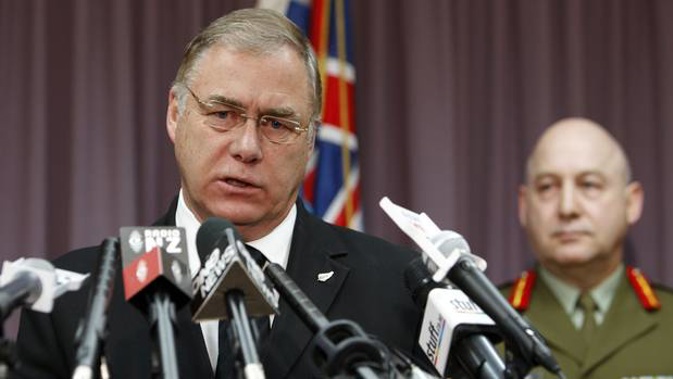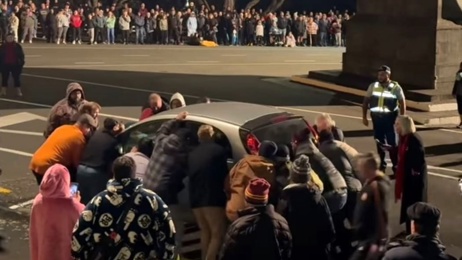
Former defence minister Wayne Mapp says he was briefed on Operation Burnham before it was carried out because coincidentally, he and the Defence Force Chief were in Afghanistan when it was carried out.
Mapp was giving evidence at an inquiry today into the conduct of SAS personnel while deployed in Afghanistan.
Journalists Nicky Hager and Jon Stephenson have alleged in their book Hit & Run that the SAS carried out a raid in 2010 that killed civilians.
"I have always believed that once the allegations about possible civilian casualties in Afghanistan had been made, those allegations should be investigated," said Mapp, who was defence minister in the National government of John Key at the time.
Mapp said the SAS were under the day-to-day operational command of the ISAF (International Security Assistance Force) Special Forces Command but New Zealand retained full command of all of its personnel.
"I did not approve or select missions for the SAS," Mapp said.
He said that as defence minister, he received briefings on SAS operations in Afghanistan after they had occurred.
By coincidence he and then Defence Force Chief Lieutenant General Jerry Mateparae (now Sir Jerry, New Zealand's High Commissioner to the UK) were in Afghanistan at the time Operation Burnham was carried out.
"As a result of being in Afghanistan, I was briefed on the operation prior to it being undertaken," he said.
He said New Zealand decided to redeploy the SAS to Afghanistan after careful thought and deliberation.
"The decision was made in response to requests for assistance and as part of New Zealand's broader commitment to Afghanistan. This was in fulfilment of our responsibilities to collective security and to peacekeeping."
The former Labour government had deployed the SAS twice before to Afghanistan.
Mapp said it was appropriate that New Zealand play its part in contributing to ensure a secure environment in Afghanistan that would allow the war-torn country to rebuild.
Mapp's evidence did not go into events around the SAS raid in August 2010.
Hager and Stephenson claimed in their book that the SAS carried out a "revenge" raid which left six civilians dead, including a 3-year-old girl named Fatima. Another 15 were wounded.
The assault came after the August 4, 2010, death of New Zealander Lieutenant Tim O'Donnell.
The New Zealand Defence Force (NZDF) has rejected the claims, saying nine insurgents were killed in the raid.
Earlier today, Australia's former Defence Force chief Air Chief Marshal Sir Angus Houston told the inquiry the single greatest setback to operational success in Afghanistan was civilian casualties.
"By far and away it is the innocent civilian population that has suffered the most in Afghanistan. For every new well put in, new school opened or road paved, the death of a civilian put the cause back," he said.
Houston said there were very few set battle pieces and no demarcated front lines.
"Quite literally a soldier could be standing beside someone in an Afghan village who, hours or days later, might take up arms against him."
Houston said that despite precautions and training, civilian casualties did occur and they did affect the personnel involved.
"As a commander this was also on my mind, as I know they did not go to Afghanistan to causes the deaths of innocent people. And I know we now have some soldiers still bearing those scars," Houston said.
The Government announced in April last year that an inquiry into Operation Burnham and related matters would be held.
The inquiry, which is being led by former prime minister Sir Geoffrey Palmer and former Supreme Court judge Sir Terence Arnold, aims to establish the facts in connection with the allegations, examine the way the NZDF dealt with the reports of civilian casualties and look at the conduct of NZDF personnel.
Mapp was quizzed by Palmer on a number of points in his evidence.
Palmer made a point about the fact the SAS did not publicise its activities.
He referenced Mapp's evidence that during previous deployments, former prime minister Helen Clark had said the SAS would carry out "direct action" missions but there would be no publicity unless there were SAS casualties.
A well-known exception to that was when Corporal Willie Apiata was awarded the Victoria Cross of New Zealand.
Human rights lawyer Deborah Manning, who represents Afghan villagers in the inquiry, has launched legal action seeking a judicial review of the investigation which she says should be more open. That matter will be heard later this month.
In his opening remarks this morning, Arnold said much of the information relevant to the inquiry was likely to remain classified and not able to be disclosed.
The inquiry had established a process for reviewing classified information which had led to some additional information being publicly disclosed. More may follow.
"The inquiry does understand the public interest in its work and wishes to be as open as it can in the circumstances. In addition to meeting its obligations to core participants, the inquiry wants to do what it can to assist public understanding of the issues," he said.
A small but peaceful protest was held outside the hearing this morning. Placards and chalk-drawn messages on the pavement claimed civilian deaths in the SAS operation. As the hearing got underway, a handful of people in the audience held up small signs before leaving.
Take your Radio, Podcasts and Music with you









